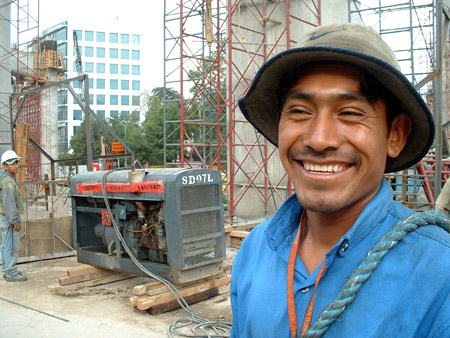|
Reviews of Recent Independent, Foreign, & Documentary Films in Theaters and DVD/Home Video
Produced, Photographed & Directed by: Juan Carlos Rulfo. Edited by: Valentina Leduc Navarro. Music by: Leonardo Heiblum. Released by: Kino International. Language: Spanish with English subtitles. Country of Origin: Mexico. 84 minutes. Not Rated. In the Pit is a grown-up take on the popular construction videos for toddlers. From March 2003 through December 2005, Juan Carlos Rulfo trailed after a dozen workers along the Mexico City’s mammoth Periférico freeway, where a second deck was being added to the existing highway. The title is a metaphorical stretch, as only the opening and closing segments take place down in the pilings with the masons. Rulfo documents his increasing rapport with the workers while enterprisingly clamoring up to the heights, where the skilled iron workers enjoy unique views of women’s legs in the passing cars, and then down below in the traffic with a truck driver carting concrete. Only after a lot of braggadocio and macho camaraderie do the men confide their feelings about work (“No iron, no work, no food on the table”) and more (one admits to hitting his wife when he gets drunk). They let Rulfo into their homes and see them away from work with their families or hobbies, including foreman Vincencio’s parallel life as a cowboy. The sole woman is Sofía, whose morbidly ominous warnings about dead souls become as repetitive as the guys’ teasing. Interspersed throughout is 35mm time lapse photography of the big cranes and other equipment at work, sunrise to sunset, recalling Powaqqatsi and Naqoyqatsi. The massive traffic jams reinforce how the annoyed commuters, constantly thwarted by the resulting traffic delays, most likely perceive the construction workers. The project shares a commonality with the notorious Big Dig in Boston or any number of reconstruction projects in Manhattan. The magnificent last five minutes justify the human scale of the film, but it seems like a long time getting there. It is only in this extended aerial traverse of the project’s entire 17-kilometer length that the staggering context of the project is clear, as no engineers or planners had been interviewed or maps shown. The music by Leonardo Heiblum, who also scored the Bolivian documentary The Devil's Miner around local sounds, is outstanding and original, building from actual construction noise and rhythms.
This construction project is exactly the kind of traffic-generating endeavor environmentalists have fought against in the U.S. and stopped, such as
the Embarcadero Freeway in San Francisco. The final footage, after the closing credits, features the Mexico City subway, perhaps implying that is what should be expanded instead of the highway.
Nora Lee Mandel
|

